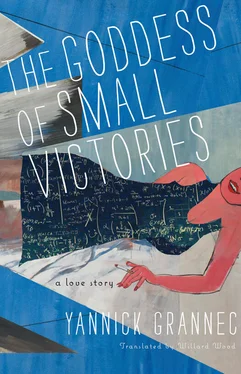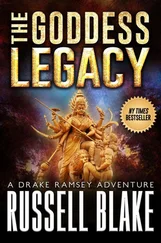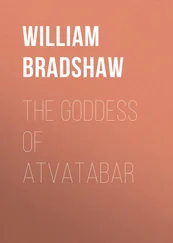“Delightful prospect!”
I would soon have the opportunity to visit Europe again. I missed traveling, and I couldn’t help but know that my poor mother was eking out her last months. It would cost me little in the way of lost intimacy: Kurt and I had had separate bedrooms for a long time. Our social life, always sparse, was fraying, just as my hair was falling out in fistfuls in the bathroom sink each morning.
Kurt picked up my sewing basket. He attacked the imperfect balls of yarn, putting back in order what had no need of it.
“How sloppy you are, Adele. Look at all these threads.”
“I hear the telephone.”
Since Albert’s death, Kurt had been living in a state close to stupor. His friend couldn’t die. His demise was incompatible with logic. Der kleine Herr Warum was still asking himself disconcerting questions: “Isn’t it strange that he died fourteen days after the twenty-fifth birthday of the Institute?” He disliked my answer: death is logical, since it’s in the nature of things. Once more he had stopped eating and drinking. He went nowhere without his satchel of medications. He had again chosen inner exile.
“A student asked to talk to you about his grant. I told him you weren’t available today.”
“Good. I’m always being harassed by students.”
He was exaggerating. His reputation as an odd duck mostly kept the bothersome at bay. He scratched his head. His balaclava made him itch terribly, but he refused to take it off. He had finished neatening up the spools and was looking at his empty hands. I smiled, remembering Albert’s tortuous way of getting rid of unwanted visitors. He would ask to be served soup; if he wanted to continue the conversation, he would push the bowl away from him; if he kept it in front of him, Helen, his assistant, would know that it was time to show the visitor to the door. Given his status, he could have acted more directly. Kurt’s tactic was to give an appointment and not show up. This minor form of cowardice didn’t surprise me.
“You should take a nap, Kurt. To be in top form tonight.”
“I can’t sleep.”
“You’re not getting enough exercise. You don’t walk anymore.”
“Who is there to walk with?”
Reminding him of my own existence was useless. He missed his walks with Albert, but he missed their endless arguments more.
“ Ach! I hear something. My mother is awake.”
I rose painfully from the deck chair. My knees ached. Tief wie die Erde, hoch wie das Tier, meine Freunde! The ground is low, and the animal is high, my friends!
Shortly after Albert’s death, Kurt had helped Bruria Kaufman, Einstein’s scientific assistant, to sort through the papers still in his office at the IAS. He had resigned himself to this mission, in place of a farewell ceremony. Albert had died in his sleep on April 18, 1955. His body had been cremated in Trenton that very day. His friends had scattered his ashes in secret. Einstein hated the idea that his grave might become a site of pilgrimage, a sanctuary holding the bones of a saint. During his lifetime he had refused to become an idol; he didn’t want to be stuffed and mounted after his death. Yet he would be.
I settled my mother, Hildegarde, in a chair in the shade. I wrapped her in a plaid blanket and gave her a plate of crackers so that her hands would have something to do. Penny, who knew my mother for an easy mark, circled her chair yapping with joy. Kurt inquired after my mother’s health, less because he was interested than because he had nothing else to do. She looked at him suspiciously, then lost all interest in him. She offered the dog a cracker.
“She doesn’t recognize me this morning. She thinks I’m Liesl.”
“I couldn’t stand to see my own mother in such a state.”
I bit my tongue. It was a good bet that Marianne would live to be a hundred. Tough meat goes bad slowly. My poor mother was slipping away in a desperate state of mental deterioration: she got lost, spat out her food, and shat where she stood. Kurt worried about growing senile himself. At the age of fifty-two, he thought his life was behind him. He’d been singing me the same sad song for more than twenty years. I’d never had a chance to drive in a landau; between my man and my mother, I’d been stuck with a wheelchair. Fate had given me a wimple to wear.
“Adele, your mother is drooling.”
I rose to straighten her out and wipe her mouth.
“Is that the telephone?”
“You’re fretting. You should do some work instead.”
“Knowing that they’re going to arrive in less than an hour? I’ll never manage to concentrate!”
“Go sit in the living room. Listen to some music. Watch some television. Don’t you have any letters to write?”
“I don’t feel like it. Are you sure that isn’t the telephone ringing?”
Once in his dead friend’s office with the door closed, Kurt had tried to say his goodbyes. He had sorted through mountains of paper, looking for a last trace of genius. The boxes he filled contained nothing more than barren equations. He came home steeped in dust and sadness. He, too, needed someone to admire. He had loved Albert’s all-powerful faith, his energetic yearning for the quest, for battle. In this heap of yellowing documents, he had recognized his own failings. It was no longer his fight. He was no longer the young warrior thrusting darkness aside. He was — and for a long time had been — an old man.
Einstein had not caught his white whale. He had pursued his research on the Grand Unification for years, his theory of unified fields. 58The system would bring together all the basic interactions of matter with the inconvenient fact of gravitation, as he had explained to me on that long-ago night. Quantum mechanics had never satisfied him as a description of the physical world. At the end of his life, Albert had become a respectable antiquity. With quantum physics showing irresistible momentum, the father of relativity had been relegated to the role of kindly benefactor, conferring flowers on the scientific stars of the moment. Gravitation continued to separate the two worlds, like an apple seed lodged in the cogwheels of the machinery of the cosmos. Newton must have been having a good laugh up there. If there was one person capable of dismantling and reassembling the “grandiose mechanism” of the universe, it should have been Albert Einstein. In the harmony of nature’s forces, coherent from the infinitely small to the infinitely large, he saw evidence of the divine spirit. He wanted to know God’s thoughts; the rest was all detail. And now he had reached the last rung of Jacob’s ladder, the one that takes you to the feet of God. He had no doubt discovered Truth, but he had lost the power to impart it.
Had my husband ventured into these realms in the secrecy of Albert’s office? Had he tried to surpass the father? Or did he know that the attempt was vain? Pauli had taken the place of paterfamilias, but he wouldn’t carry that torch for long. When it came to his old friend’s blackboard, Kurt couldn’t bring himself to erase it. Time would smear the chalk marks. Entropy would take care of the slate. It had already had its way with Albert’s hide.
“That was our neighbor’s radio. I asked him to make less noise while you were napping.”
“I caught him spying on me over the hedge. I don’t trust that man. We were right to buy the adjoining lot in back. Who knows what might have happened to us?”
“A little less peace and quiet, maybe.”
“Did you get the meat? Rudolf has a big appetite.”
“Enough to feed the Gödel family tree back to its roots.”
“And for side dishes?”
“Why do you care? You don’t eat anything!”
“I want Rudolf and my mother to feel comfortable in my house.”
Читать дальше












